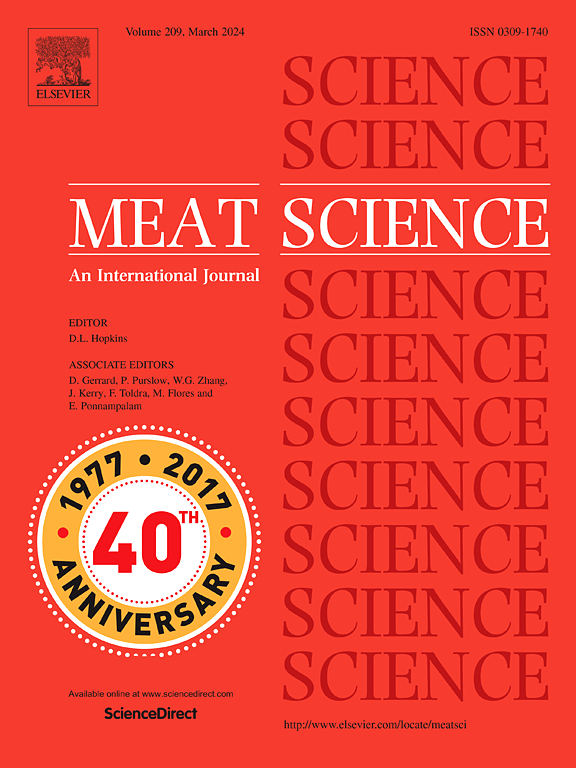液体浮萍和胶囊浮萍(Lemna minor L.)提取物在包装牛肉汉堡的保质期内形成不同的代谢组指纹。
IF 6.1
1区 农林科学
Q1 Agricultural and Biological Sciences
引用次数: 0
摘要
氧化变质和失色是限制新鲜牛肉汉堡的保质期和消费者接受度的关键因素。本研究评估了小柠檬草(浮萍)提取物的液体形式(LLE),并包被阿拉伯胶(AGL)或麦芽糖糊精(ML),作为天然抗氧化剂,在4°C保存14天的牛肉汉堡中。提取液在0.1%、0.5%和1% (w/w)的浓度下进行测试,并通过理化、微生物学和非靶向代谢组学分析评估其效果。两种载体的包封率都很高(约80%),阿拉伯胶保持了较高的抗氧化能力。1%的液体提取物和0.1%的胶囊提取物是最有效的处理,在第7天保持红度,将脂质氧化降低到感官脱味阈值以下,并限制氧气消耗。相反,高剂量的胶囊提取物(0.5- 1%)效果较差,在某些情况下还会产生促氧化作用。非靶向代谢组学揭示了氧化生物标志物的调节,包括谷胱甘肽、血红蛋白和色胺,支持浮萍提取物在稳定脂质和蛋白质氧化途径中的抗氧化作用。无抗菌作用。这些研究结果表明,浮萍提取物可以作为新鲜牛肉汉堡的可持续植物性抗氧化剂,胶囊形式的推荐用量为0.1% (w/w),液体提取物的推荐用量为1% (w/w)。这代表了在肉类系统中首次展示以鸭杂草为基础的抗氧化剂,为合成防腐剂提供了一个有前途的替代品,并支持肉类工业向清洁标签战略的过渡。本文章由计算机程序翻译,如有差异,请以英文原文为准。
Liquid and encapsulated duckweed (Lemna minor L.) extracts differentially shape metabolomic fingerprints of packaged beef burgers during shelf-life
Oxidative deterioration and color loss are critical factors limiting the shelf-life and consumer acceptance of fresh beef burgers under modified atmosphere packaging (MAP). This study evaluated Lemna minor (duckweed) extracts, applied in liquid form (LLE) and encapsulated with gum Arabic (AGL) or maltodextrin (ML), as natural antioxidants in beef burgers stored at 4 °C for 14 days. Extracts were tested at 0.1 %, 0.5 %, and 1 % (w/w), and their effects were assessed through physicochemical, microbiological, and untargeted metabolomics analyses. Encapsulation yields were high (∼80 %) for both carriers, with gum Arabic retaining higher antioxidant capacity. The liquid extract at 1 % and the encapsulated extracts at 0.1 % were the most effective treatments, preserving redness, reducing lipid oxidation below the sensory off-flavour threshold, and limiting oxygen consumption by day 7. Conversely, higher doses of encapsulated extracts (0.5–1 %) were less effective and in some cases induced pro-oxidant effects. Untargeted metabolomics revealed modulation of oxidative biomarkers, including glutathione, hemin, and tryptamine, supporting the antioxidant role of duckweed extracts in stabilising lipid and protein oxidation pathways. No antimicrobial effect was observed. These findings indicate that duckweed extracts can serve as sustainable, plant-based antioxidants for fresh beef burgers, with recommended application levels of 0.1 % (w/w) for encapsulated forms and 1 % (w/w) for liquid extracts. This represents the first demonstration of duckweed-based antioxidants in meat systems, offering a promising alternative to synthetic preservatives and supporting the transition toward clean-label strategies in the meat industry.
求助全文
通过发布文献求助,成功后即可免费获取论文全文。
去求助
来源期刊

Meat Science
工程技术-食品科技
CiteScore
12.60
自引率
9.90%
发文量
282
审稿时长
60 days
期刊介绍:
The aim of Meat Science is to serve as a suitable platform for the dissemination of interdisciplinary and international knowledge on all factors influencing the properties of meat. While the journal primarily focuses on the flesh of mammals, contributions related to poultry will be considered if they enhance the overall understanding of the relationship between muscle nature and meat quality post mortem. Additionally, papers on large birds (e.g., emus, ostriches) as well as wild-captured mammals and crocodiles will be welcomed.
 求助内容:
求助内容: 应助结果提醒方式:
应助结果提醒方式:


